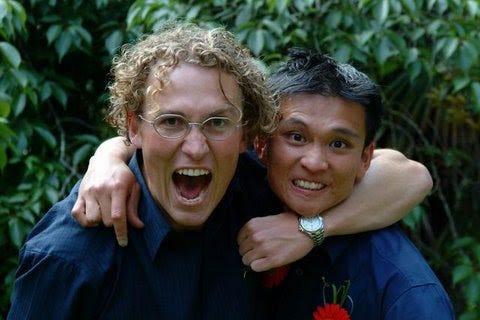“What do you say when people ask, ‘What do you do?’”
The question came from my friend Sam, who’s just quit his job.
Together, Sam and I co-founded two businesses. The first, a user research consultancy, was sold to PwC in 2014. The second, a SaaS business supporting user researchers, was sold to a private equity firm in 2021 (although we both remain minority shareholders).
Thanks to selling these two businesses, along with a few smaller startup investments that have returned 7-8 times the money I put in, I stopped working in February 2021 when I was 43 years old. Since then, I’ve done bits and pieces of consulting and governance work, but my main focus has been on being the best dad I can be to an 11- and 13-year-old (who are with me half the time).
Like me, Sam became financially independent after our business exits. But unlike me, he kept working until recently. Now, he’s pulled the trigger and retired.
Well, Sam, I dread the question.
Whenever someone asks, “What do you do?” I feel like what they’re really asking is “What’s your role in society?” And when I reply “retired,” I feel a subtle shame. It’s pretty unusual, after all—only 1% of Americans aged 40 to 44 are retired, and I suspect it’s similar in New Zealand. The label has always felt uncomfortable, like wearing a badge that says, “I’ve quit.”
Part of the problem is in the definition of retirement. When people hear that you’ve retired, they often assume you’ve stopped working entirely. That makes sense, that’s the definition after all, but it doesn’t capture the full picture. When Roger Federer retired from tennis at age 41, did anyone expect him to move to a retirement home and sit around doing nothing all day? Of course not. In fact, he describes himself as “graduating from tennis,” not retiring.
As a society, we need to broaden our definition of retirement to include a variety of activities. Perhaps we could learn from Japan, where there isn’t even a word for “retire” in the sense of permanently leaving the workforce. Or maybe a better way to define retirement is separating your finances from your work, which allows you to gain control over how much you work, who you work with, and what you do.
Anyway, given all this messiness, when the dreaded question comes up I usually say, “I’m semi-retired.” It’s a bit of a dodge, but I doubt I’m completely done with everything that could be termed “work.” Of course, all of us are more than what we do for a living, so maybe I should be saying “I’m a retired person who likes to spend a little time on my laptop, get some exercise, read, and spend evenings relaxing with family and friends—maybe with a board game and a homebrew or two.” Or, maybe the best response is to say “I’m a full-time human being,”—but I don’t want to be punched. I would punch me.
This wasn’t Sam’s only question. He went all in and asked for all of my advice on retiring early. Well, Sam, you might have been joking, but I have decided to go all in and write this playbook. I’m semi-retired—what the hell else am I going to do with my time?
Before we dive in, two points:
Advice is almost always gift-wrapped and doesn’t match the messiness of life. Nothing in life is this tidy. And advice often takes the form of someone extrapolating a general rule from a single lived experience. So, ignore the confident tone, what worked for me will not always work for you. In the words of Hunter S. Thompson when asked for advice by a close friend, “What is truth for me could be disaster for you.” So if you’ll indulge me giving you advice about receiving advice, follow what Bruce Lee said and “Absorb what is useful. Discard what is not. Add what is uniquely your own."
I am also keenly aware of my good fortune. I did not grow up wealthy but I’ve had many privileges: race, gender, and background. I was lucky enough to attend university, do a degree in a desirable field, and graduate with only a small student loan. I have been blessed with good health and haven’t had to deal with any major financial crises. I live in New Zealand, a country with a high standard of living and solid social support systems. I know I am lucky and am grateful for where I am at.





